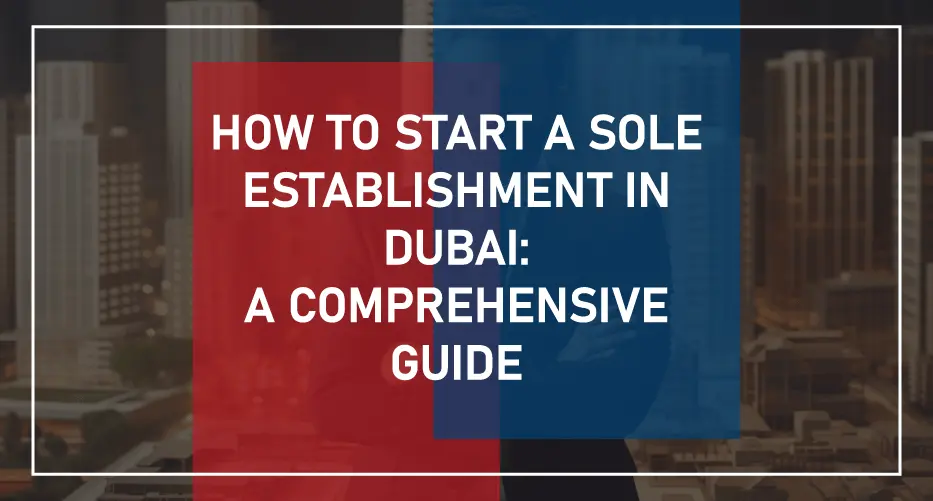Sole Establishment Business Setup in Dubai: A Complete Guide

Introduction: What is a Sole Establishment in Dubai?
A sole establishment in Dubai, often referred to as a sole proprietorship, is a business structure where an individual has full ownership and control of the business. This setup is ideal for entrepreneurs, freelancers, and professionals seeking complete autonomy over their operations. Unlike other business models, a sole establishment does not require partnerships or shareholders, allowing the owner to make decisions without external influence.
Dubai, as one of the fastest-growing business hubs in the world, offers a favorable environment for sole establishments. Entrepreneurs benefit from a simplified registration process, strategic location, and access to a booming market. A sole establishment can be set up for various business activities, including professional services, trading, consulting, and more, making it a versatile choice for anyone looking to establish a business presence in the UAE.
As businesses increasingly explore sole establishments, it’s essential to understand the benefits, challenges, and costs associated with this business model to make informed decisions. This guide provides a step-by-step breakdown of the registration process, costs, and benefits of setting up a sole establishment in Dubai.
Benefits of Setting Up a Sole Establishment in Dubai
Setting up a sole establishment in Dubai offers numerous advantages that appeal to both local entrepreneurs and foreign investors. Below are the key benefits:
Get a free consultation:
Recent post:
5 Expert Tips for Starting a Business in the UAE
Introduction to Starting a Business in the UAE: Challenges and Opportunities Starting a business in the UAE is a thrilling venture brimming with
How to Setup a Foreign Company Branch in UAE
How to Setup a Foreign Company Branch in UAE The United Arab Emirates (UAE) stands as a beacon of economic dynamism, attracting a
How to Start a Successful Used Car Business in UAE
Why Start a Used Car Business in the UAE? In recent years, the UAE's economy has burgeoned into a hub for diverse business
Low Setup Cost
Compared to other business structures like limited liability companies (LLCs) or partnerships, establishing a sole proprietorship is more cost-effective. Entrepreneurs enjoy a streamlined registration process that requires fewer legal formalities, reducing the overall cost of setup.
Key expenses include:
- License fees: These can vary depending on the nature of the business but are generally more affordable than other business licenses in Dubai.
- Office rent: For many types of sole establishments, particularly professional services, the need for large commercial spaces is minimal, allowing owners to keep overhead costs low.
- Document processing: With fewer legal requirements, the cost of documentation and approvals is significantly reduced.
For freelancers and small business owners looking for an economical way to enter the Dubai market, a sole establishment provides a budget-friendly solution while maintaining the flexibility to expand over time.
100% Ownership of the Business
One of the most attractive features of a sole establishment is that it allows full 100% ownership to the individual setting up the business. In contrast to some other business models in the UAE, which previously required a local partner or sponsor for foreign ownership, a sole establishment grants complete control over decision-making and profits. This structure is particularly beneficial for those who want:
- Full authority over business operations
- Complete profit retention
- Greater control over the company’s direction
Foreign investors, particularly those in professional sectors such as consulting, medical services, or design, find this structure appealing because they don’t need to share ownership with a local entity. Moreover, as legal reforms have reduced the need for local sponsorship in various sectors, more expatriates can now start their sole establishment without external partnerships, aligning perfectly with their long-term business goals.
Freedom to Operate in Various Sectors
A sole establishment provides entrepreneurs with the flexibility to operate in a wide range of sectors. Whether you’re a freelancer offering professional services or an individual interested in starting a trading business, the scope of business activities that can be pursued under this model is broad.
Popular sectors for sole establishments include:
- Professional services (e.g., consultants, freelancers)
- Trading businesses (import/export activities)
- Medical consultancy
- Marketing and advertising
- Creative services (e.g., photography, design)
This flexibility is a significant draw for entrepreneurs with diverse business interests. They can tap into different markets and sectors, leveraging Dubai’s strategic location and thriving economy. Furthermore, Dubai’s business-friendly regulatory environment encourages sole proprietors to expand their operations without the constraints imposed by other business structures.
Sole Establishment Business Setup in Dubai: A Complete Guide
Step-by-Step Guide to Setting Up a Sole Establishment in Dubai
Setting up a sole establishment in Dubai is a straightforward process, but it requires careful attention to detail. Here’s a step-by-step guide to help you navigate the process efficiently.
1. Choose Your Business Activity
The first and most crucial step is to determine the nature of your business activity. Dubai’s Department of Economic Development (DED) has a comprehensive list of activities that can be performed under a sole establishment license. These activities fall into various categories, including:
• Professional services (e.g., consulting, marketing, accounting)
• Trading (import/export)
• Freelancing (e.g., graphic design, copywriting)
• Medical services (consulting and specialized health practices)
It’s essential to select an activity that aligns with your skills and business goals. Once your business activity is identified, it becomes easier to follow the specific regulations and requirements associated with it.
Eligibility Criteria
To qualify for the 2-year investor visa, investors must meet the following criteria:
- Property Value: The property must be worth at least AED 750,000
- Ownership: Property owners with payment plans or mortgages are eligible, regardless of the initial down payment amount.
- Location: The property must be located in a freehold area designated for foreign ownership.
2. Obtain Initial Approvals
Once your business activity is chosen, you need to secure initial approvals from the relevant authorities. This step ensures that your business concept complies with Dubai’s legal and regulatory framework. Depending on the nature of your business, you might need approvals from specific regulatory bodies:
• Professional services: May require approval from professional councils or associations.
• Medical services: Require approval from the Dubai Health Authority (DHA).
• Import/export businesses: Need permission from customs authorities.
Initial approval is typically processed through the Department of Economic Development (DED), and in some cases, you may be asked to provide a feasibility study or a business plan.
3. Submit Required Documents
After securing initial approval, you will need to submit various documents to proceed with the registration process. These documents typically include:
• Passport copies of the business owner
• Visa copies (if applicable)
• No Objection Certificate (NOC) from your current employer (if applicable)
• Proof of residence (utility bills, tenancy contracts)
• Business name approval (from DED)
Make sure that all documents are up to date and comply with the format required by the authorities. Failing to submit accurate documents could delay the process..
Eligibility Criteria
To qualify for the 2-year investor visa, investors must meet the following criteria:
- Property Value: The property must be worth at least AED 750,000
- Ownership: Property owners with payment plans or mortgages are eligible, regardless of the initial down payment amount.
- Location: The property must be located in a freehold area designated for foreign ownership.
4. Pay the Fees
Once your documents are in order, the next step is to pay the required fees to obtain your sole establishment license. Fees will depend on the nature of your business activity and the location of your office. This step involves both government fees and potential additional costs such as document processing charges.
5. Receive Your License
Upon successful payment and submission of the required documents, your business will be registered, and you will receive your Sole Establishment License from the DED. Once your license is in hand, you are legally allowed to begin operating your business in Dubai.
The entire process typically takes between 1-2 weeks, depending on the nature of the business and the speed at which documents are processed.
Cost Breakdown of Sole Establishment License
Understanding the costs associated with setting up a sole establishment in Dubai is essential for budgeting. The costs vary depending on your business activity and office location, but here is a breakdown of the primary expenses you’ll need to cover..
6. Documents Required for Sole Establishment Registration
To register a sole establishment in Dubai, you need to prepare and submit several essential documents. These ensure your business complies with the legal requirements of the UAE.
These steps and documents form the backbone of the registration process for a sole establishment in Dubai, ensuring that your business complies with legal standards from the very start.
Challenges of Setting Up a Sole Establishment in Dubai
While setting up a sole establishment in Dubai offers numerous benefits, it’s essential to be aware of the potential challenges. Understanding these obstacles will help you prepare effectively and navigate the process smoothly.
Unlimited Liability
Limitations in Growth and Expansion
Dependency on the Owner
Difficulty in Attracting Investors
Tax Implications of Owning a Sole Establishment in Dubai
One of the key considerations for any business setup is understanding the tax obligations. While Dubai is known for its favorable tax environment, it’s still crucial to be aware of any applicable taxes and how they affect your business.
1. Corporate Tax
As of now, sole establishments in Dubai are exempt from corporate tax on income generated from their business activities. This tax-free environment remains one of the primary attractions for entrepreneurs setting up in Dubai. However, businesses involved in international trade or operating in specialized sectors might have specific tax regulations, so it’s always advisable to stay informed.
2. VAT (Value-Added Tax)
Sole establishments in Dubai are required to comply with the UAE’s Value-Added Tax (VAT) regulations. VAT is currently set at 5%, and businesses with an annual turnover exceeding AED 375,000 must register for VAT and file returns accordingly. Businesses with lower turnovers can opt for voluntary VAT registration.
VAT Registration Thresholds:
• Mandatory registration: Annual revenue exceeding AED 375,000.
• Voluntary registration: Annual revenue between AED 187,500 and AED 375,000.
3. Personal Income Tax
One of the most favorable aspects of Dubai’s tax regime is the absence of personal income tax. Business owners of sole establishments are not required to pay taxes on the income they earn from the business, making it highly attractive for entrepreneurs.
4. Social Security Contributions
If you’re a UAE national or a GCC national, you will need to contribute to social security (pension and other benefits) if you hire local employees. The rate for social security contributions is typically 12.5% for UAE nationals, while expatriates and non-GCC nationals are exempt.
5. Other Taxes
Certain business activities, especially those involved in import/export or trading across UAE borders, may be subject to customs duties. It’s important to consult with a financial advisor to ensure compliance with all tax regulations, particularly if your business involves cross-border transactions.
Conclusion and Summary
In summary, establishing a sole establishment in Dubai provides entrepreneurs with 100% ownership, low setup costs, and the freedom to operate across various sectors. However, the challenges such as unlimited liability, difficulty in attracting investors, and dependency on the owner should be carefully considered and mitigated through strategic planning.
The tax environment is highly favorable, with no corporate or personal income tax, but businesses must comply with VAT regulations and understand potential sector-specific taxes.
Dubai’s business-friendly regulatory framework, combined with the simplicity of the setup process, makes it an attractive location for entrepreneurs seeking to launch professional services, consultancy, or freelance businesses. With the right preparation, a sole establishment can be a powerful vehicle for achieving your business goals.
Ready to start your business in Dubai? Contact Dahhan Business Services for expert guidance and tailored solutions that will simplify the process and ensure your success.



